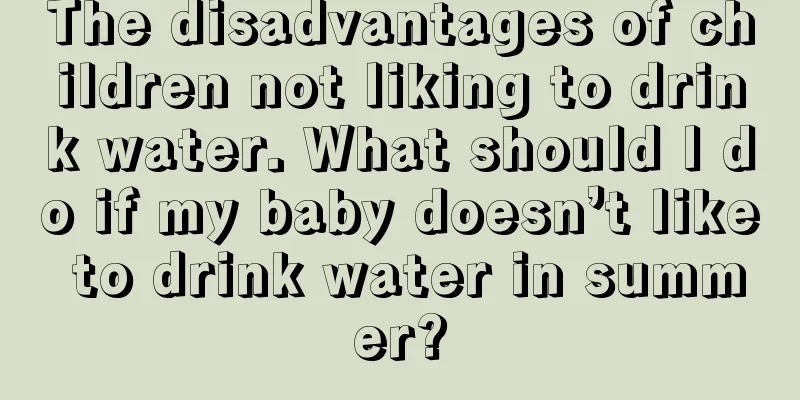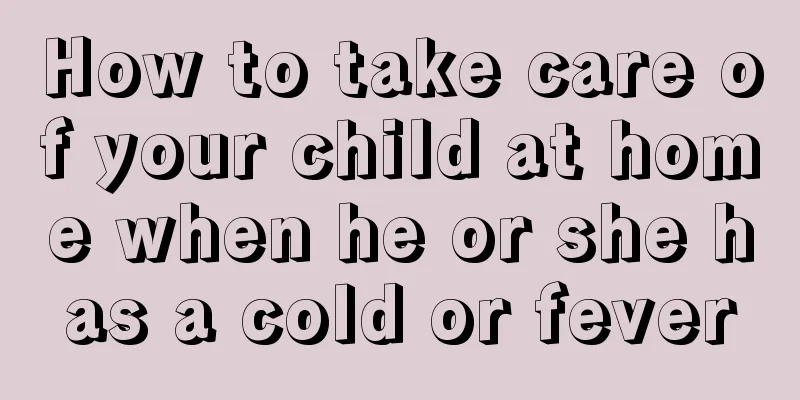The disadvantages of children not liking to drink water. What should I do if my baby doesn’t like to drink water in summer?

|
Summer is here, and many babies sweat a lot when doing outdoor sports. Today, let's introduce in detail what will happen to the body if the baby doesn't like to drink water. And how to make children love drinking water. In the hot summer, you must remember to replenish water in time after losing a lot of water. The disadvantages of children not liking to drink waterChildren are in a critical period of growth and development. If they lack water, their health will be more seriously damaged. The latest research shows that lack of water can also damage children's cognitive ability and affect brain development. How should children of different ages drink water and how much water should they drink? Life Times interviewed Du Songming, an associate researcher at the Nutrition and Food Safety Institute of the Chinese Center for Disease Control and Prevention, on these issues that parents are concerned about. Q.What special health significance does water have for children? A: Children and adolescents have a larger body surface area, a higher water content and metabolic rate, and a limited kidney regulation capacity, making them more susceptible to water deprivation or deficiency. A study found that children who were naturally dehydrated tended to have reduced auditory digit span, semantic flexibility, and image recognition abilities, indicating that water deprivation can also reduce children's cognitive abilities. Two other studies showed that after mildly dehydrated children drank a certain amount of water, their sense of happiness, visual attention, and visual tracking ability and other short-term memory improved. Q.At what age do children start to need to drink water? A: The World Health Organization recommends that infants under 6 months old should be exclusively breastfed, so the water content in breast milk can meet the needs of infants. Infants over 6 months old should gradually be given complementary foods, which should also be mainly liquid foods containing a lot of water. After the baby is 6 months old, he or she can drink water appropriately. Q.How much water do children of different ages need to drink? A: Children of different ages have different basal metabolism and physical activity, and they need to drink different amounts of water. Specific recommendations have been written into the "Reference Water Intake Standard for Chinese Residents", which has not yet been officially published. I can give you a general idea: Children aged six months to one year old need to drink 0.9 liters of water per day; children aged one to four years old need to drink 1.3 liters of water per day; children aged four to seven years old need to drink 1.7 liters of water per day; children aged seven to 11 years old need to drink 1.8 liters of water per day. Q: When is it not appropriate for children to drink water? When is the best time to drink water? A: Generally speaking, it is not advisable to drink a lot of water within 1 hour before meals or during meals, because children's digestive ability is generally weak. Drinking a lot of water before and during meals will dilute gastric juice and affect digestion. It is also not advisable to drink a lot of water after intense exercise. After intense exercise, the body's cells are in a state of severe dehydration. Sudden excessive water replenishment will cause the cells to absorb water and swell. It is recommended that children drink water between meals, in small amounts and multiple times. Do not wait until you are thirsty to drink water, because at this time the body is already dehydrated and has suffered a certain degree of damage. Q.Which liquid foods can replace water and which cannot? A: The water content in our traditional diet (including soup, fruit, porridge, vegetables, etc.) is within a stable range and can replace water. Although juice and various beverages contain water, we do not recommend that children use them as the main source of water because they contain energy or other substances. It is best to drink boiled water to replenish water. Q: It seems that drinking boiled water is the healthiest. But what if children don’t like to drink boiled water? How can we cultivate good habits of drinking water in children? A: First, parents should let their children get used to a light diet and give them less sweet drinks. Secondly, parents should set an example by drinking boiled water and less drinks. It is best not to have sweet drinks at home. Finally, let children have boiled water at all times, remind them to drink water frequently, and develop the habit of bringing boiled water with them when going out. It is harmful for babies not to drink water1. Kidney stones come to you. The habit of not liking to drink water will cause the urine to be in a concentrated state for a long time, which invisibly creates extremely favorable conditions for the formation of stones; 2. Reduces the baby's cognitive ability. A study found that children who are dehydrated in natural conditions tend to have reduced auditory digital span, semantic flexibility and image recognition abilities, indicating that dehydration can reduce children's cognitive abilities. 3. Prone to constipation. Babies usually drink too little water, which can easily lead to constipation. The old stool and toxins in the body cannot be eliminated smoothly, and the gastrointestinal function will also be inhibited. 4. It is easy to get heatstroke in summer. In hot summer, the water and organic salt in the baby's body will be discharged with sweat. If the water is not replenished in time, it will affect the heat dissipation ability of the baby's skin and cause heatstroke. Tips to make your baby love drinking waterParents should be united in their stance If you think something is right, you must stand firm. All parents must communicate well, and never let the "loophole" of "you can't get it from mom, but you can get it from dad" happen. Both parents must be very clear: beverages cannot replace boiled water. Beverages often contain more sugar and electrolytes, and taste good, but they cannot leave the stomach as quickly as boiled water after drinking. If beverages stay in the stomach for a long time, they will cause adverse stimulation, affect digestion and appetite, and increase the burden on the kidneys. Actions speak louder than words If you ask your child to drink more water while you are drinking Coke, it is not convincing and the child will feel unfair. The child grows up watching his parents. If he sees his parents pouring a glass of water when they are thirsty, he will naturally learn to drink water; if he sees his parents often looking for drinks in the refrigerator, he may drink secretly even if he dares not to do so in front of them. If you don't want your child to hold a bottle of drink all day, then the first thing parents should do is not to buy it or store drinks at home. Even if you occasionally let your child satisfy his craving, he should drink it on the spot. Don't show weakness in a confrontation When children insist on drinking beverages, parents should not compromise because they are worried about their children's insufficient water intake. The word "fear" can easily make parents passive. Unless the child is dehydrated (such as not moving, dry skin, chapped lips, etc.), parents do not need to be too anxious. Turning passivity into initiative Try to get your child to drink water, but make it natural, not forced. For example, prepare a bottle of water at the place where the child is active, observe how much he drinks, and remind him if he drinks too little, but don't force him; when the child is thirsty or hungry and asks you for something to eat during non-meal time, ask him to drink water first. Tips to induce drinking more water You can add lemon slices and apple slices to boiling water to make the water look beautiful and have a light fruity flavor, which will increase the fun of children drinking water. |
<<: What should I do if my child lacks confidence? How can I make my child confident and bold?
>>: Are scented candles harmful to the human body? Can scented candles be lit overnight?
Recommend
How about the Orbit baby stroller? Is the Orbit baby stroller good?
Orbit baby is a baby product company from the Uni...
Is it better for children to change their teeth early or late? Is it better for children to change their teeth early?
Tooth replacement is a sign of a child's grow...
The correct way to use a breast pump Precautions for using a breast pump
Breast pumps are a good helper for working mother...
How should pregnant women take care of themselves? The second
Many pregnant women do not have very good physica...
Can pregnant women drink ginger soup when they have a cold? Generally,
Pregnant women can drink ginger soup when they ha...
What can't pregnant women eat when they have a cold? These are all taboos
Things that pregnant women cannot eat when they h...
Can babies eat clams? At what age can babies eat clams?
Clams are a delicious food that is not only nutri...
How to push and breathe during a normal birth? How to cooperate with the doctor during a normal birth?
Natural childbirth is not as scary as we think. I...
How to eliminate the fear of childbirth in pregnant women
People will feel fear when facing unknown things,...
Will children really become dumber and fatter if they don't get enough sleep?
I have never understood how some people can wake ...
If the pregnancy test stick shows one dark and one light, does it mean that I am pregnant? What is the reason for the pregnancy test stick to show one dark and one light?
If there are two lines on the pregnancy test stic...
What to do if there are lumps in the breast? It is necessary to express milk
It is easy for lumps to appear in the breasts whe...
How long is the shelf life of mouthwash? Can you still use it if it's expired?
Try not to swallow mouthwash when using it, but i...
What causes jaw pain in children and how to treat it
Does your child grind his teeth? Or does he have ...
What causes baby eczema? What causes baby eczema?
Most newborn babies will have eczema. Some babies...









